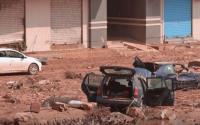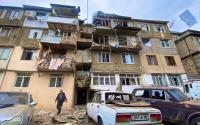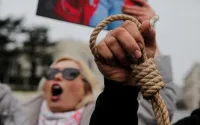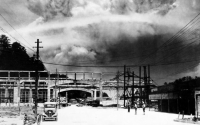Common Dreams / Published on Sunday, November 9, 2003 by the New York TimesMaureen Dowd
In the movie "The Untouchables," Sean Connery, a cop named Malone, instructs a naïve Eliot Ness on going up against gangsters.
"If you open the can on these worms you must be prepared to go all the way, because they're not gonna give up the fight until one of you is dead," he says. "You wanna know how you do it? They pull a knife, you pull a gun. He sends one of yours to the hospital, you send one of his to the morgue. That's the Chicago way, and that's how you get Capone. Now do you want to do that? Are you ready to do that?"
As the president offered his lofty "vision thing" for spawning democracy in the Middle East, America was at a rough juncture. The administration opened the can on these worms in Iraq. Are Americans now prepared to do what it takes?
The Bush crowd hurtled into Baghdad on the law of Disney: Wishing can make it so. Now they're ensnared in the law of the jungle: the rules of engagement don't apply with this scary cocktail of Saddam loyalists, foreign fighters and terrorists, who hold nothing sacrosanct, not human rights organizations, humanitarian groups or Iraqi civilians.
The gangsters are getting ever bolder about picking off our soldiers on land and out of the sky. With three Army helicopters hit in the last two weeks, killing 22 Americans, soldiers are reduced to flying low and fast, as they scan for the glint of sunlight coming off the rockets of the invisible guerrillas. It's an eerie flashback to the 10-year war of attrition Afghans waged against the mighty Soviets, when worn-down Soviet soldiers complained that the Afghan fighters were "ghosts" who would shoot down their helicopters with American Stinger surface-to-air missiles and fade back into the mountains.
On Wednesday, Senator John McCain offered a vinegary critique of the Bush team, urging the president to be more engaged on Iraq, and not leave decisions to subordinates. He also swatted Donald Rumsfeld's assertion that troop levels are fine, saying 15,000 more troops should be dispatched to avoid risking "the most serious American defeat on the global stage since Vietnam."
Senator McCain, nervous about both Army morale and Iraq shattering, believes we must get in deeper to make progress.
Administration officials, nervous about President Bush's election chances shattering, believe we must show progress by starting to pull out.
That is why the Pentagon announced last week it would reduce the number of troops by next summer, replacing them with Iraqis.
But some fret that the Pentagon — growing desperate as the Turks, the Indians, the Pakistanis and other allies refuse to send reinforcements — has been turning out new Iraqi police officers and guards as swiftly and sloppily as Lucy and Ethel turned out chocolates on the assembly line.
The Washington Post reported that tens of thousands of Iraqis were being shoved into action "with little or no formal training in democratic standards and relevant job skills."
Many diplomats were shocked to read the Times report that the back-channel attempt of Iraqis to avert war, with Richard Perle as go-between, was blown off with the C.I.A. message, "Tell them that we will see them in Baghdad."
But the Bush brigade had many dovetailing reasons not to be dovish.
Mr. Rumsfeld thought the war could showcase his transformation of the military to be leaner and more agile. Paul Wolfowitz thought the war could showcase his transformation of Iraq into a democracy. Dick Cheney thought the war could showcase his transformation of America into a dominatrix superpower. Karl Rove thought the war could showcase his transformation of W. into conquering hero. And Mr. Bush thought the war could showcase his transformation from family black sheep into historic white hat.
But now Wolfie's messianic vision of growing democracy in the Middle East is at odds with Rummy's stubborn desire to shrink the Army.
Our military around the globe is tapped out, so strained by Iraq and Afghanistan, as the Times military correspondent Michael Gordon discovered, that a unit from the Army's Old Guard is even being dispatched overseas. The guard is best known for ceremonial duties such as standing vigil at the Tomb of the Unknowns at Arlington National Cemetery and serving in color guards for visiting dignitaries.
The Old Guard has not been deployed abroad since Vietnam.
Copyright 2003 The New York Times Company






